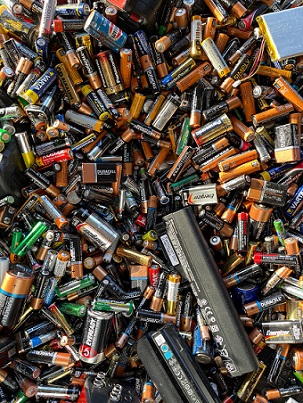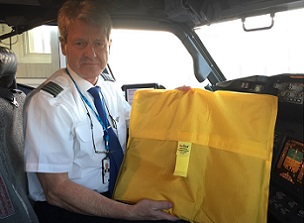 Discarded lithium batteries can easily get crushed and spark serious fires in bin lorries and recycling centres
Discarded lithium batteries can easily get crushed and spark serious fires in bin lorries and recycling centres
 All these everyday electronic devices are powered by lithium batteries but at some point will end up being thrown away
All these everyday electronic devices are powered by lithium batteries but at some point will end up being thrown away
 A pilot with an AvSax lithium battery containment bag
A pilot with an AvSax lithium battery containment bag
Councils must radically change the way they collect electrical rubbish to prevent hundreds of fires a year.
Millions of everyday items ranging from mobile phones and toys to vacuum cleaners are powered by lithium ion batteries but these can catch fire and even explode if they are damaged or crushed.
Over the last year in the UK there have been 700 fires caused by damaged lithium batteries in recycling centres or waste collection lorries – and the worst was at a Suez recycling centre in Aberdeen last July which tore through the plant and took days to put out.
Now the British Metal Recycling Association (BMRA) says the only way to cut down on this ever-increasing number of fires and increase public safety is for councils to collect electrical items at the kerbside.
The amount of items being thrown away is incredible with the BMRA estimating there were 2 million discarded in the UK in just four weeks last year between the end of November and the end of December.
The problem is electrical items are being thrown away in the general waste and when these items are crushed their lithium batteries are damaged, go into what’s called thermal runaway and spark a fire among the other rubbish.
Some of these fires can be huge with entire recycling centres wrecked costing countless millions of pounds.
There have also been several cases where bin lorries have caught fire while being driven in towns and cities.
Thermal runaway happens when one cell in a battery overheats it can produce enough heat – up to 900℃ (1652℉) – to cause adjacent cells to overheat. This causes the battery to catch fire or even explode.
The worst place this can happen is in the confined space of a passenger aircraft which is why most airlines now have a warning as part of every safety briefing to passengers before a flight to alert cabin crew if their electronic device such as a mobile phone or iPad becomes hot to the touch or catches fire. Many airlines now carry lithium battery fire containment bags called AvSax (www.avsax.com) to deal with the problem and the company which devised the bags is now working on similar safety ‘burnbags’ for the recycling industry.
It can’t come soon enough with all the fires the industry is now facing every year – almost two a day – which is why it’s vital electrical items are collected separately.
The BMRA says the number of fires caused by waste electrical and electronic equipment (WEEE) is three times higher than initially thought.
BMRA chief executive James Kelly said: “Councils need to introduce kerbside collections for discarded WEEE items. That is because we are seeing increased fires happening in bin lorries and at household waste recycling centres as well as metal recycling sites like those of our members where these items can end up in the incorrect waste stream. People’s lives are at risk.
“If there is not an easy option, such as kerbside collection, it is likely that much of this will be disposed of incorrectly. This massively increases the risk of fires across the waste sector. That is why we need to see kerbside collections introduced right away.”
The BMRA says the fires are often caused by damaged lithium batteries inside the discarded electrical items. There have long been fears that they cause fires, but research by the Recycle Your Electricals campaign led by Material Focus – an independent non-profit organisation dedicated to getting more electricals recycled - say they can now be linked to 700 fires in the past 12 months.
According to the results of the recent survey by Material Focus, fires caused by batteries are potentially a far bigger issue than previously reported in waste sector reports. The survey shows that nearly 90% of the 60 local authorities surveyed said fires caused by batteries are “an increasing problem.”
London Mayor Sadiq Khan recently said he had “serious safety concerns” about some lithium-ion batteries used to power e-scooters.
His warning came after the London Fire Brigade reported there had been 130 fires in 2022 involving the batteries, 65 used by e-bikes, 24 used by e-scooters and the remainder involving those used in e-cigarettes. Some are known to overheat when being charged.